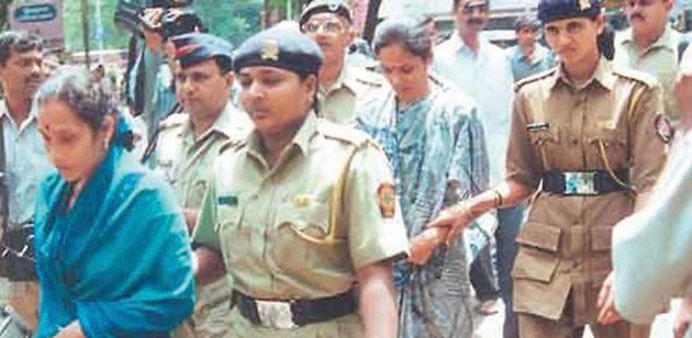Agencies/Mumbai
Two women on death row for murdering five children have lodged a last-ditch appeal after the president rejected their mercy plea, clearing the way for them to become the first women executed in post-independence India.
Renuka Shinde and her step-sister Seema Gavit were convicted in 2001 of kidnapping 13 children, forcing them to join a gang of thieves and murdering at least five of them.
They were reportedly recruited into a life of petty crime as teenagers by their late mother, and used the children to distract their victims while the sisters robbed them.
Shinde, 45, and Gavit, 39, were found guilty of kidnapping the 13 children in Maharashtra. They were initially accused of murdering nine of their victims, but prosecutors were only able to prove that they killed five.
The Supreme Court upheld their sentence in 2006 and last month President Pranab Mukherjee, who has the power to commute a death sentence, rejected their appeal.
“They very clearly executed their plans of kidnapping the children and the moment they were no longer useful, they killed them,” the Supreme Court said when it upheld the death sentence. “They had become a menace to society and the people in these cities were completely horrified and they could not even send their children to school.”
Legally the sisters have now exhausted all avenues to appeal against their sentence.
But on Monday their lawyer said he would lodge a petition with the Bombay High Court, where they were originally convicted, on the grounds that the 13-year delay in carrying out the sentence was excessive.
“There has been an inordinate delay in carrying out the death sentence. So I will pray to the courts to commute the same into life behind bars,” said Sudeep Jaiswal, who has represented the two sisters since 2010.
“I will file the writ petition today.”
In a landmark ruling this year, the Supreme Court said “inordinate and inexplicable” delays in carrying out executions were grounds for commuting death sentences.
The women, being held in Yerawada Central Jail near Pune, could, in theory, be hanged at any time. Nobody from the jail was available for comment. Reports in the local media say officials there are engaged with the police, local officials and doctors on when the hanging should proceed.
Debate is continuing as to whether or not the two women should be hanged. Dhananjay Mahadik, the member of parliament for Kolhapur, where the women were from, said he personally felt women in India should not face the death penalty.
Yet, Mahadik, a member of the Nationalist Congress Party, added: “The crime they were convicted of was very serious. They slaughtered those children, they did not kill them. They made them beg for them and they killed those children who knew nothing of this world. The court has ordered this and I agree.”
Campaigners against execution have in recent years been pushing the authorities in India to move away from handing down the death penalty, even though a number are ultimately commuted.
“The two women were convicted for crimes that the courts have determined meet the present Indian legal standard,” said Meenakshi Ganguly, of Human Rights Watch. “We believe that the death penalty should be abolished because it is inherently inhumane.”
She added: “We urge that all countries, including India, declare an immediate moratorium on capital punishment and work towards repealing it altogether.”
Since 1983, the Indian courts have handed down the death penalty only for the “rarest of rare” cases. In recent years, just a handful of executions have been carried out, most notably that of Pakistani militant Ajmal Kasab, who was hanged in 2012 for his part in the 2008 attack on Mumbai.
In the aftermath of the 2012 Delhi gang-rape and murder of a young student, new laws were introduced to specify the death penalty for murder cases where rapes are involved. Records suggest no women have ever been executed.
Earlier this year a Mumbai court ordered three men to hang for their involvement in two gang-rape cases, the first death sentences to be handed down for multiple sex attacks since the law was toughened last year.
Their sentences must be confirmed by the Supreme Court.
The last person to be executed in India was a local Kashmiri man last year over a deadly 2001 attack on the national parliament in New Delhi.

